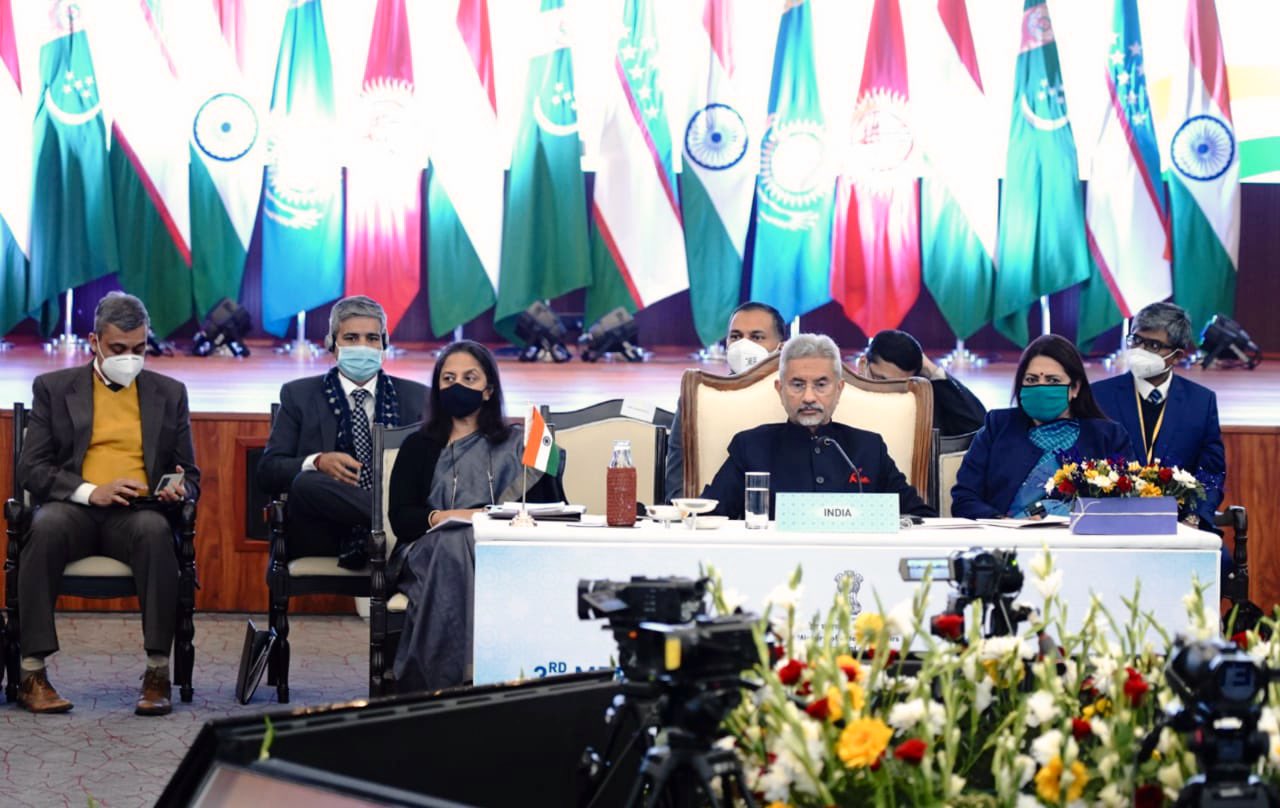Last Updated on December 19, 2021 6:44 pm by INDIAN AWAAZ
AMN / Staff Reporter
In the 3rd meeting of the India-Central Asia Dialogue, the foreign ministers of India, Republic of Kazakhstan, Kyrgyz Republic, Republic of Tajikistan, Turkmenistan and Republic of Uzbekistan today reiterated strong support for a peaceful, secure and stable Afghanistan while emphasizing the respect for sovereignty, unity and territorial integrity and non-interference in its internal affairs. They also discussed the current humanitarian situation and decided to continue to provide immediate humanitarian assistance to the Afghan people.

A Joint Statement released after the India-Central Asia Dialogue said, the members emphasized on the civilizational, cultural, trade and people-to-people linkages between India and Central Asian countries and reaffirmed their commitment to building a comprehensive and enduring India-Central Asia partnership.
The sides discussed the current situation in Afghanistan and its impact on the region.
The members reiterated strong support for a peaceful, secure and stable Afghanistan while emphasizing the respect for sovereignty, unity and territorial integrity and non-interference in its internal affairs. They also discussed the current humanitarian situation and decided to continue to provide immediate humanitarian assistance to the Afghan people.
The members reaffirmed the importance of UNSC Resolution 2593 which unequivocally demands that Afghan territory not be used for sheltering, training, planning or financing terrorist acts and called for concerted action against all terrorist groups. The members also agreed to continue close consultations on the situation in Afghanistan.
The members condemned terrorism in all its forms and manifestations and reiterated that providing safe haven, using terrorist proxies for cross-border terrorism, terror financing, arms and drugs trafficking, dissemination of a radical ideology and abuse of cyber space to spread disinformation and incite violence, goes against the basic principles of humanity and international relations. They called for early adoption of the UN Comprehensive Convention on International Terrorism.
The members agreed that through dynamic and positive changes in the countries of Central Asia, sustainable and stable development of the region as a whole will be ensured. They expressed satisfaction at the ongoing Central Asia-India cooperation in the fight against Covid-19 pandemic.
The members supported gradual restoration of the people-to-people contacts, tourism and business ties between India and Central Asian countries. Kazakhstan and Kyrgyz Republic Foreign Affairs Ministers welcomed the mutual recognition of Covid-19 vaccination certificates between India and their countries while Tajikistan, Turkmenistan and Uzbekistan looked forward to early mutual recognition of vaccine certification with India.
They appreciated the important role of the Indian Technical and Economic Cooperation (ITEC) Programme in capacity building and human resource development of their countries.
The Ministers noted the need for continued large-scale and long-term economic cooperation between Central Asian countries and India in order to strengthen and expand interconnectivity. Foreign Minister of Turkmenistan stressed on the importance of TAPI gas pipeline project.
The members emphasized on optimum usage of the International North-South Transport Corridor as well as Ashgabat Agreement on International Transport and Transit Corridor to enhance connectivity. India welcomed the interest of Central Asian countries to utilize the services of Shahid Beheshti Terminal at Chabahar Port for facilitating their trade with India and beyond.
External Affairs Minister Dr S Jaishankar hosted the Central Asian Foreign Ministers to a welcome dinner last evening. In a tweet, Dr Jaishankar said the cultural show was just one more reminder of the closeness between India and Central Asia.
The Foreign Ministers of the Central Asian countries are expected to pay a joint courtesy call on Prime Minister Narendra Modi.
The ministers also emphasized on optimum usage of the International North-South Transport Corridor (INSTC) as well as Ashgabat Agreement on International Transport and Transit Corridor to enhance connectivity between India and the Central Asian countries.
The meeting, stressed on to include Chabahar Port within the framework of INSTC and expressed interest in cooperation on issues related to the development and strengthening of regional connectivity in Central and South Asia.
Apart from this, the Foreign Ministers discussed the current situation in Afghanistan and its impact on the region, following the Taliban’s occupancy. Issues like current humanitarian situation, terrorism, territorial integrity, respect for sovereignty and unity were discussed too.
